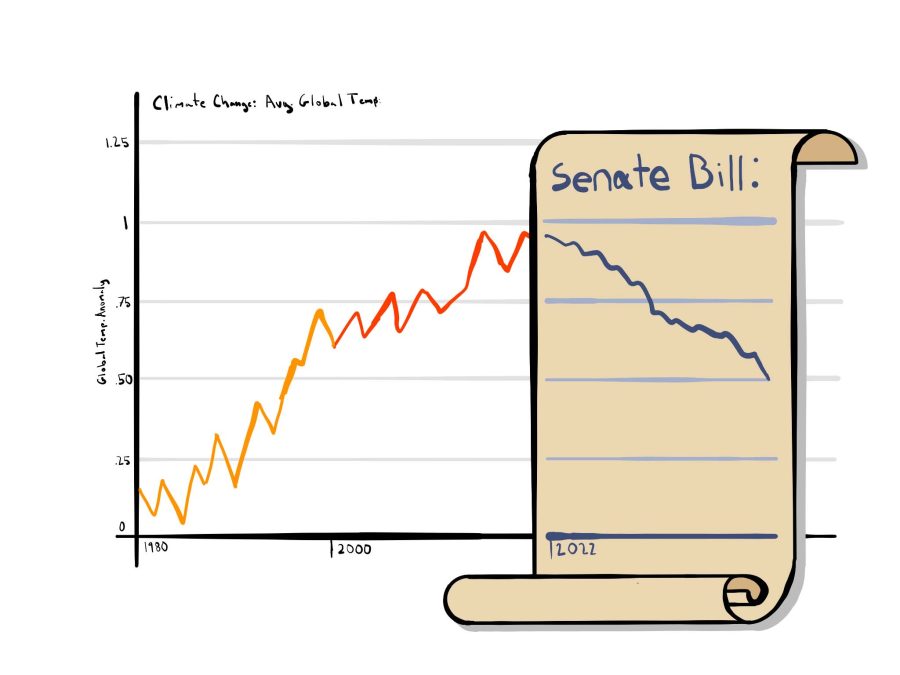Two California Senate bills, passed by state legislators and signed by the governor in 2015 and 2016, went into effect last month. The pieces of legislation are meant to ensure cities are combating climate change and reducing methane emissions by minimizing compost waste.
Chartered in October 2015, Senate Bill 379 requires cities and counties to officially make plans to combat the changing climate. Cities and counties are required to do so by January 2017 or January 2022, based on when that jurisdiction had implemented a local hazard mitigation plan.
A local hazard mitigation plan is a city plan to anticipate and reduce exposure to natural disasters. Palo Alto’s LHMP, led by city Emergency Manager Nathaniel Rainey, was adopted as part of a county multi-jurisdictional effort in 2017. Rainey said the plan has three main parts.
“(First), we look at the hazards that any jurisdiction may face,” Rainey said. “Then we look at our local capabilities. What are the abilities of the city to mitigate and prepare for those hazards? And then we think about what the projects are, what the different activities are that we can put in place to reduce the likelihood of those hazards.”
Rainey said Palo Alto had been addressing climate change for years before the governor and legislature passed SB 379, so the bill won’t affect Palo Alto much.
“If you take a deep look at what Palo Alto has done, the decisions that our policymakers have made over the last 10 years, you’ll see that we’ve been leading the way on local policies and programs,” he said.
Chartered in September 2016, Senate Bill 1383 aims to reduce methane emissions by reducing organic waste ending up in landfills. Methane, a greenhouse gas, has over 80 times the global warming potential of carbon dioxide.
“If we get rid of the methane emissions, that’s going to be essentially a quick way we can alleviate the climate crisis,” Lance Klug, Public Information Officer of CalRecycle, said.
In 2020, CalRecycle finalized regulations to achieve these goals, currently taking effect across the state. Klug said CalRecycle’s primary goal is to work with cities and counties to set them on the right track. Jurisdictions that repeatedly avoid necessary steps can face punitive measures.
“We can put them on a compliance plan, where they have to follow these very specific steps,” Klug said. “And if not, they could face, eventually, penalties up to $500 to $10,000 per day.”
While an estimated half of the jurisdictions in California are rolling out these programs, California legislators acknowledge that some cities and are not yet ready to do so. In 2021, the State Senate passed Senate Bill 619 that allows unprepared jurisdictions to submit a notification of intent to comply in order to avoid penalties. These notifications must be submitted to CalRecycle by March 1 of this year.
However, Klug said implementing these programs in some jurisdictions may cause more harm than benefit. Senate Bill 619, passed in 2021, allows communities with low populations or in high elevations to receive exemptions or waivers from SB 1383.
“The reality is, if you did (impose on) a Northern California county which has just a few hundred people in their community, it’s going to take more greenhouse gas emissions to halt organic waste and create new facilities than it’s going to save in the long run.”
Overall, though, Klug said the bill will provide economic benefits for California.
“Implementation is expected to create nearly 18,000 jobs at the peak of implementation, and nearly 12,000 of those are permanent jobs,” he said. “We’re projecting $12.8 billion in economic activity as a result of this law.”
SB 1383 also aims to rescue edible food from being composted, reallocating it to Californians in need.
“All the food that grocery stores (discard) that is still edible, either they bought too much or they’re not able to sell it, they are now going to be required to donate that food to help feed the one in five Californians who is food insecure and doesn’t have enough to eat every night,” Klug said.
Chuck Muir, Manager of Environmental Control Programs at Zero Waste Palo Alto, said Palo Alto is already a state leader in diverting compostable and recyclable waste from landfills, but the city still strives to do more.
“We have a high diversion rate goal of 95% by 2030,” Muir said. “Eighty percent of all the waste that’s generated in Palo Alto gets diverted from the landfill, so that’s probably one of the highest, if not the highest, in the state.”
Muir also said Palo Alto is working with the rest of Santa Clara County to meet the requirements that SB 1383 poses, particularly with respect to businesses. The county has hired a consultant, Joint Ventures Silicon Valley, that will visit restaurants and grocery stores to ensure they are donating unused food to food recovery organizations.
Regarding residential households, the city will monitor homes by conducting bi-annual checks on the home’s garbage, recycling and compost containers. While Muir said Palo Alto will see little change from Senate Bill 1383, it will help make sure other communities in the state are doing their part.
“We’ve been collecting compostables for a while. The state now has a requirement in place, not just Palo Alto but all of California, that puts more weight behind actually sorting the material out. It’s a priority for CalRecycle, it’s a priority for the state of California, and therefore, hopefully, it’s going to be a priority for the community to do its part.”



